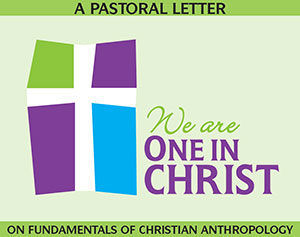Guide to assist parishes, individuals in studying pastoral letter

By Natalie Hoefer
The archdiocesan Office of Catechesis has developed a concise, six-page study guide for parish or individual use in reflecting upon and implementing Archbishop Charles C. Thompson’s recently released document, “We are One in Christ: A Pastoral Letter on Fundamentals of Christian Anthropology.”
“I see broad potential for [the guide’s] use, ranging from individual reflection to activities and assignments that could be given to groups of young people, and everything in between,” says archdiocesan director of catechesis Ken Ogorek, whose staff compiled the guide.
(Download the study guide here | En español)
The idea came about during an Indianapolis South Deanery priests’ meeting on Feb. 27.
“We commented on the pastoral letter that came out in The Criterion [on Feb. 16],” says Father Stephen Banet, pastor of St. Jude Parish in Indianapolis and dean of the south deanery. “The priests said [a study guide] is something they could use in their parishes for discussion.”
The next day, Father Banet reached out to Ogorek with the idea.
Ogorek and his staff embraced the task and within three weeks compiled a six-page, downloadable study guide. It includes prayers for possible use before a group or individual reviews the questions provided in the pastoral study guide. Separate questions are provided for adults and for youths and young adults.
One section of questions exists for each of the six topics addressed in the archbishop’s pastoral letter: Human Dignity; Plight of Immigrants, Migrants and Refugees; Drug Abuse; Religious Liberty; and Respect for Human Life.
In addition to the questions, says Ogorek, “with each section we invite people to express their desire to learn more about the topic. Also, near the end we invite people to consider what additional topics might flow from the foundation that Archbishop Thompson has provided.”
The archbishop is pleased with the availability of the study guide to accompany his pastoral letter.
“The purpose of a pastoral letter is that it be able to address particular concerns at any given moment,” Archbishop Thompson explains.
“While a pastoral letter does not provide all the answers on a given subject or circumstance, it is meant to prompt further reflection, dialogue and discernment toward better understanding and possible solutions,” he notes. “The study guide should help to facilitate a process for both individuals and parishes in this regard, especially in terms of providing some type of local or concrete means of conversion, evangelization and response to the concerns outlined in the pastoral letter.”
When she heard that a study guide was being created, archdiocesan director of social concerns Theresa Chamblee was grateful.
“When I begin to speak about the inherent dignity of every person from conception to natural death, I find most people would agree that everyone has the right to life,” she says. “But where the area becomes gray is when social issues in correlation to the right to life are discussed.”
She sees the study guide as a useful tool in helping parishes and individuals “tackle some tough life and dignity issues through the lenses of Catholic social and moral teaching.”
One of the ministries Chamblee oversees is Catholic Charities’ Parish Social Ministry (PSM). The new guide will be a “great resource” in this area, she says.
“A large part of PSM is assisting parishes in growing their charitable outreach to those within their parishes and the surrounding community—basically helping all of us see the face of Christ in those we encounter, and we in turn becoming the face of Christ to them,” Chamblee explains. “But, before that can truly happen, ongoing spiritual formation rooted in our Catholic moral and social teachings is key.
“The pastoral letter study guide is a great resource that can be used in the spiritual formation process to assist parishes as they prayerfully reflect on the importance that every life is sacred and should be treated with great dignity.”
Ogorek cites three primary goals for the guide.
“I hope people will get the benefit of hearing directly from our chief shepherd and catechist on several important topics,” he says.
Secondly, he hopes that “reading and prayerfully reflecting on the pastoral with the help of this guide will draw people deeper into relationship with Jesus, because we know that love of neighbor goes hand in hand with love of God.”
Finally, Ogorek says, “I would hope the guide will help people put meat on the bones of what it means to love our neighbor and to live out the reality that ‘We are one in Christ.’ ”
(For a copy of the study guide, go to archindy.org/catechesis/documents/Pastoral-Letter-Reading-Guide.pdf, or go to archindy.org, select “Catechesis” from the Offices tab, then click on the “Resources” icon, where both the pastoral letter and study guide can be found under “Pastoral Letter.” For those without Internet access, call the Office of Catechesis at 800-382-9836, ext. 1550, or 317-236-1550.) †
